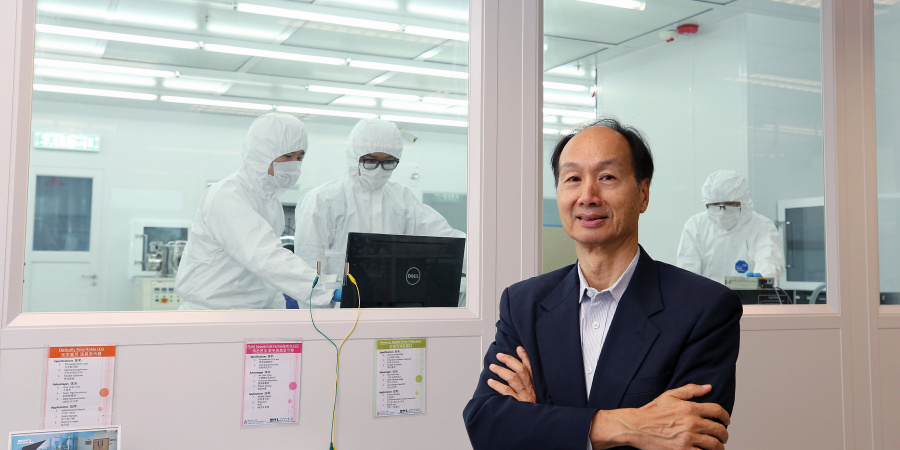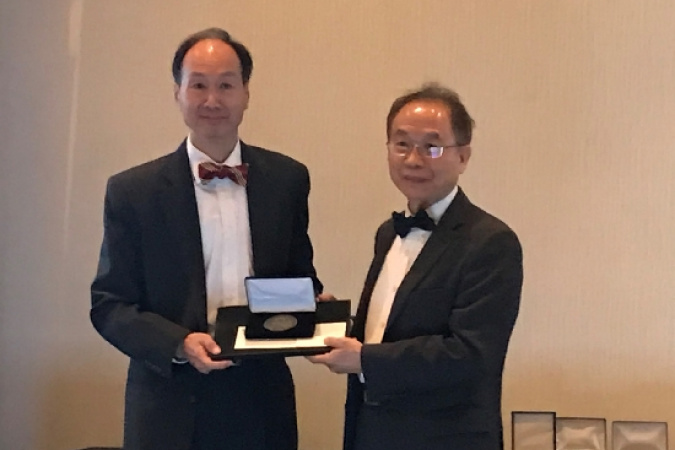HKUST Scholar Prof. KWOK Hoi-Sing Reaps Prestigious Prize for Contributions to LCD Science and Technology
Prof. KWOK Hoi-Sing, Chair Professor from the Department of Electronic and Computer Engineering and Dr. William MW Mong Professor of Nanotechnology, The Hong Kong University of Science and Technology (HKUST), has been awarded the prestigious 2019 Jan Rajchman Prize by the Society for Information Display (SID). The honor recognizes an outstanding scientific or technical achievement in, or contribution to, research on flat panel displays.
The award citation says the accolade was presented to Prof. Kwok “for his contributions to liquid-crystal display (LCD) science and technology, and particularly to photoalignment technology and bistable displays”.
The prize was presented during the SID Award Banquet on May 13, 2019 in San Jose, California, US. He is the second recipient of the Jan Rajchman Prize at HKUST since fellow Prof. TANG Ching-Wan received his award in 2001.
“I feel tremendously honored to receive this recognition. Indeed this is a high point in my research work on display technology that spanned over one quarter of a century,” said Prof. Kwok.
Specifically, Prof. Kwok’s contributions included the development of liquid crystal on silicon display technology, reflective technology, and photoalignment technology, which gives liquid crystal their alignment property, using light.
“While we have made incremental improvements to numerous aspects of display technology, what I would label as a ‘breakthrough’ is in the speed of response in liquid-crystal display. The response time used to be 10 milliseconds. We reduced it 500 times and now the response time can be as short as 100 microseconds. Also, our recent technology on coatable polarizers may revolutionize the way we make flexible and foldable displays,” Prof. Kwok said.
Prof. Kwok joined HKUST in 1992, just a year after the University was established. In 1994, he set up the Center for Display Research (CDR) with four faculty members and served as the Director. Building on the work of CDR, the State Key Laboratory of Advanced Displays and Optoelectronics Technologies was established in 2013 at HKUST and Prof. Kwok has also served as the Director.
The State Key Laboratory has five core research areas – organic light-emitting diode (OLED) devices; thin-film-transistor (TFT) technologies, LCD devices; optoelectronic components; and video signal technologies. The research team consists of members from all over the world including Mainland China, Ukraine, Russia, India and Hong Kong to create a world-class platform on display research.
Prof. Kwok received his early education in Hong Kong, before furthering his studies in the US. He received his MS and PhD degrees in Applied Physics from Harvard University.
About The Hong Kong University of Science and Technology
The Hong Kong University of Science and Technology (HKUST) (www.ust.hk) is a world-class research university that focuses on science, technology and business as well as humanities and social science. HKUST offers an international campus, and a holistic and interdisciplinary pedagogy to nurture well-rounded graduates with global vision, a strong entrepreneurial spirit and innovative thinking. HKUST attained the highest proportion of internationally excellent research work in the Research Assessment Exercise 2014 of Hong Kong’s University Grants Committee, and is ranked as the world’s best young university in Times Higher Education’s Young University Rankings 2019. Its graduates were ranked 16th worldwide and top in Greater China in Global University Employability Survey 2018.


